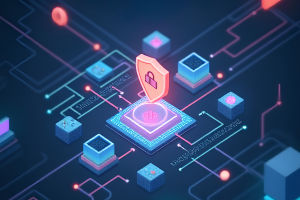In today's fast-paced digital world, social media has become an integral part of our daily lives. While it offers countless opportunities to connect, learn, and be entertained, it also comes with its own set of challenges.
One of the most significant concerns is social media anxiety, which affects many of us—whether we're constantly comparing ourselves to others or feeling overwhelmed by the never-ending stream of information.
How can we strike a balance between staying connected and protecting our mental health? In this article, we'll explore five practical methods that can help us manage social media use and maintain a healthy digital lifestyle.
1. Set Boundaries for Social Media Use
One of the most effective ways to reduce social media anxiety is by setting clear boundaries. It's easy to get lost in the infinite scroll, but by establishing limits, we can regain control over our time and energy.
• Time Limits: Allocate specific times during the day to check social media, such as in the morning or during lunch breaks. Apps like Screen Time on Phone or Digital Wellbeing on Android can help track and limit your social media usage.
• Device-Free Zones: Designate certain areas of your home, such as the bedroom or dining table, as device-free zones. This helps reduce the temptation to check notifications and allows for more meaningful face-to-face interactions.
• Notification Management: Turn off non-essential notifications, so you're not constantly being interrupted by alerts. This reduces stress and helps you focus on more important tasks.
By setting these boundaries, we can create healthier habits that allow us to enjoy social media without feeling overwhelmed.
2. Curate Your Feed
The content we consume on social media has a significant impact on our mental health. If we're constantly exposed to negative news, unrealistic beauty standards, or content that triggers feelings of inadequacy, it's no wonder we experience anxiety. Curating our feed allows us to shape our online experience to be more positive and enriching.
• Follow Positive Accounts: Follow accounts that inspire and uplift you, whether they're related to hobbies, self-care, or causes you're passionate about. Surround yourself with content that makes you feel good, rather than anxious or stressed.
• Unfollow Toxic Content: It's okay to unfollow accounts that make you feel negative or insecure. Don't hesitate to remove content that negatively impacts your mental well-being.
• Mute or Block: If you don't want to unfollow someone, but their posts make you anxious, try muting them instead. This way, you won't see their content without cutting ties completely.
Curating your feed helps ensure that social media becomes a source of joy and positivity, rather than a breeding ground for stress and anxiety.
3. Practice Digital Detox
Sometimes, the best way to deal with social media anxiety is to take a break from it altogether. A digital detox, where you disconnect from all social media for a set period of time, can do wonders for your mental clarity and emotional well-being.
• Weekend Detox: Try taking a break from social media over the weekend. Use that time to engage in offline activities like reading, hiking, or spending quality time with friends and family.
• Social Media-Free Days: Designate one day a week (like a Sunday) to completely unplug from social media. This time away from the constant barrage of updates helps reset your mind and reduce feelings of anxiety.
• Longer Breaks: If you feel like you need more time to reconnect with yourself, consider taking a week-long break from social media. This break can provide a fresh perspective and allow you to recharge.
A digital detox gives us the opportunity to step back, reflect, and restore our mental health, ultimately helping us come back to social media in a more balanced way.
4. Focus on Real-Life Connections
While social media offers a way to stay connected, it's crucial not to neglect real-life relationships. In fact, studies show that face-to-face interactions are key to improving our mental health and reducing feelings of loneliness. Focusing on in-person connections can be an antidote to the isolation we sometimes feel from endless online engagement.
• Quality Time with Loved Ones: Spend time with family and friends without the distraction of your phone. Plan activities that allow you to be fully present and engaged, such as cooking a meal together, going for a walk, or attending an event.
• Engage in Local Communities: Participate in local events, clubs, or volunteer opportunities. Engaging with your community offline can provide a sense of belonging and decrease the reliance on social media for connection.
• Deepen Conversations: Use your social media platforms to build deeper relationships by messaging or calling people directly. Rather than simply liking a post, engage in meaningful conversations that help foster authentic connections.
By prioritizing real-life relationships, we can enrich our social lives and reduce our dependency on digital interactions for validation and connection.
5. Practice Mindfulness and Self-Reflection
Mindfulness and self-reflection are powerful tools for managing social media anxiety. When we become more aware of our emotions and reactions, we can better understand the impact social media has on our mental well-being.
• Mindful Social Media Use: Before checking social media, take a deep breath and set an intention. Ask yourself, “How do I want to feel after using social media?” This simple practice can help you approach social media with more awareness and intention.
• Journal Your Feelings: After using social media, take a few moments to journal about how it made you feel. Did you feel energized or drained? Did you experience any negative emotions? This practice helps you identify patterns and better manage your social media habits.
• Gratitude Practice: To counteract the negative effects of social media, focus on gratitude. Take time each day to reflect on the positive aspects of your life, which helps shift your mindset away from comparison and anxiety.
Mindfulness and self-reflection allow us to create a healthy relationship with social media and maintain our mental well-being in a constantly connected world.
Conclusion: Embrace a Healthy Digital Lifestyle
Social media is a powerful tool that can enrich our lives, but it's essential to use it in a way that supports our well-being. By setting boundaries, curating our feeds, practicing digital detoxes, fostering real-life connections, and incorporating mindfulness, we can combat social media anxiety and build a healthier digital lifestyle.
Remember, it's not about completely avoiding social media—it's about finding balance and using it in a way that enhances our lives rather than detracts from them. How do you manage your social media use? Share your thoughts in the comments below, and let's continue the conversation about how to create a more mindful and healthy digital life.


